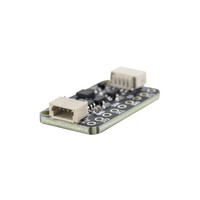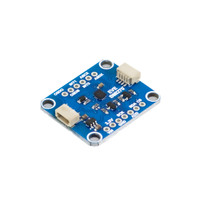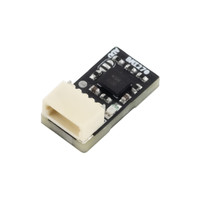The 7Semi BMI323 Nano Sensor Board delivers high-performance motion sensing in an ultra-compact Qwiic-ready module. Powered by the Bosch BMI323 IMU, this board combines a 3-axis accelerometer and 3-axis gyroscope in a space-saving form factor suitable for space-constrained wearables, drones, and compact robotics. It supports I²C communication and is plug-and-play compatible with the Qwiic ecosystem.
Designed for low power and intelligent motion recognition, this sensor is ideal for gesture detection, activity classification, orientation, and mobile asset tracking in embedded systems.
Features
-
6DOF Motion Tracking – 3-axis accelerometer + 3-axis gyroscope
-
Ultra-Low Power Operation with configurable power modes
-
Built-in Features: Step counting, tap detection, auto low-power switching
-
Dual Interface Support: I²C (up to 1MHz)
-
Qwiic-Compatible Connectors – Plug-and-play for rapid prototyping
Applications
-
Robotics & Automation – balance, direction, and movement sensing
-
Wearables & Fitness Trackers – step detection, motion recognition
-
Mobile Devices & Gesture Input – tap sensing, tilt actions
-
Navigation Systems – dead reckoning, tilt-compensation
-
Gaming Controllers & VR Systems – motion tracking
-
Vehicle and Asset Tracking – shock, vibration logging
What is Included?
-
1 × 7Semi BMI323 IMU 6DOF Sensor Board
Frequently Asked Questions (FAQ)
Q1: What makes the BMI323 different from older Bosch IMUs like BMI160 or BMI270?
A: The BMI323 offers improved power efficiency, built-in motion functions (like auto-wakeup and tap detection), a more flexible FIFO system, and a lower memory footprint.
Q2: Can this sensor be used for orientation tracking?
A: Yes, it supports gyroscope and accelerometer fusion. Combine it with a sensor fusion algorithm (like Madgwick or Kalman filter) for reliable 3D orientation.
Q3: Does it support step counting and activity recognition?
A: Yes, the BMI323 includes built-in algorithms for step counting and activity detection (stationary, walking, etc.), reducing processing load on the host MCU.
Q4: Is it compatible with Arduino or ESP32?
A: Yes, you can use I²C to connect it to ESP32, Arduino (Nano, Mega, Due), or Raspberry Pi. Libraries are available via Bosch BMI SDK or community-supported platforms.
Q5: What Qwiic port voltage should I use?
A: The board is designed for 3.3V logic systems. Do not connect it directly to 5V I²C without a logic level shifter.
Resources
-
Bosch BMI323 Datasheet.
- Sensor IC:
- Bosch BMI323
- Acceleration Range:
- ±2g, ±4g, ±8g, ±16g
- Gyroscope Range:
- ±125°/s, ±250°/s, ±500°/s, ±1000°/s, ±2000°/s
- Interface:
- I²C Qwiic
- I²C Address:
- 0x69 (default)
- Voltage Input:
- 3.3V
- Operating Temperature:
- -40°C to +85°C
- Board Size:
- ~19mm × 8mm
- Board Weight:
- 2g









